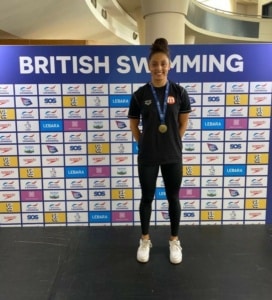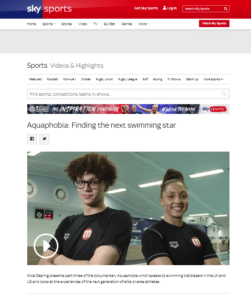Aquaphobia: Miss Calderbank’s Unique Swimming Story

“It’s important to do whatever you want to do, you don’t have to follow the standards of what a swimmer needs to do, and that’s really with any sport.”
Aquaphobia is a new documentary which investigates why so few people from Black and Asian communities swim.
The series is four parts and is presented by Alice Dearing, the first Black British woman to compete at the Olympics.
One episode follows our very own Miss Calderbank, British Swimming National Champion, as she speaks about her experience in the swimming community.
“I’ve always got comments that I don’t look like a typical swimmer.”
“Just because you’re different to the typical standards of what a swimmer looks like, tall, white…you can still do anything you want to do, and I’m an example of that.”
Miss Calderbank is aiming to be one of the next Black elite swimmers to compete in the 2024 Paris Olympics.
Members of the CHS Equalities Committee, Rory and Erin, spoke with Miss Calderbank about her swimming journey and her part in the documentary.
What made you start swimming?
I started swimming at the age of 3 and I swam from 3-11 in lessons. My mum put me in swimming lessons because she never got the opportunity to do swimming lessons and she actually still can’t swim.
When I got to 11 I completed all my badges and I waned to continue it on so I joined my local swimming club where I swum at until the age of 17. So I have quite a unique pathway when it comes to swimming as most swimmers go onto performance squads at the age of around 9,10,11 and I only joined a club at 11 and a performance squad at 17.
What made you say yes to being a part of this documentary?
I think there are a lot of myths and stereotypes with ethnic minorities and swimming. Obviously there are many less people from ethnic minorities in swimming, and there’s a reason for that I think. There are stereotypes like black people can’t swim. There is a film out about this and it really emphasises the point and that is is a big issue. A lot of ethnic minorities have less opportunity to join swimming lessons. So, just giving the opportunity of free swimming lessons and taking it on at schools is a great thing.
It can also affect hair a lot with chlorine, and the myth with denser bones too. Yes black people do have denser bones but it doesn’t make it any easier or any harder to learn to swim. So because of that there are less role models in swimming for black people.
Do you think racial inequality is still a prevalent issue in swimming?
Yes, I think this links into what I was saying in the previous question. Specifically in places like Jamaica there is such a big group of people doing athletics, where as oppose to swimming, in the Olympics last year there was only 3 people picked for aquatic sport in Jamaica, two swimmers and one diver.
Would you say sufficient measures are being taken to tackle the lack of racial diversity in sport?
In Manchester now there is more opportunity for free swimming lessons and in schools to do it for free too. So I think there is more now yes, but previously there definitely wasn’t. Looking back at the Olympics and World Championships, it was completely white dominated. Especially of a junior age, you will find more ethnic diversity but at a senior level there is still less diversity, but we are on the rise to getting there.
What changes would you like to see implemented into Sport in the near future?
I think even from a coaching perspective, there are definitely less ethnically diverse coaches and it would be great to see more. It then creates more role models.
What do you know now that you wish you could tell your younger self?
When I was younger I really wanted to be taller and have longer arms and legs, just because your typical swimmer is white, tall and has long limbs, and you do get an advantage from it. But there is always a way, and you can find that way. You may have to train differently to fit your shape and body size, but you can do whatever you want to do, you may just have to find a different way to do it.



